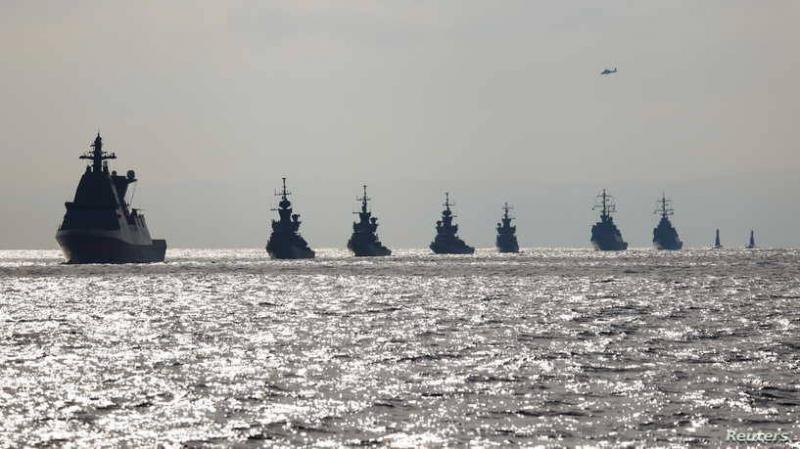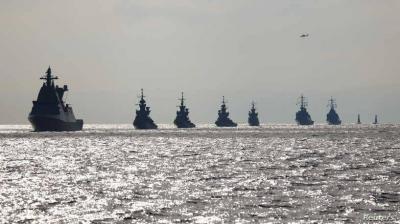A recently retired Israeli naval commander stated in an interview that the Israeli Navy has significantly increased its activities in the Red Sea in response to growing Iranian threats to Israeli maritime shipping. Vice Admiral Eli Sharvit refrained from confirming a series of attacks and incidents targeting Iranian ships that have been attributed to Israel. However, he described Iranian activities in high seas as a major concern for Israel and stated that the navy is capable of striking wherever necessary to protect the country’s economic and security interests.
Sharvit told the Associated Press, shortly after the end of his five-year term, that "The State of Israel will protect freedom of navigation around the world... this is not about being far from the country." During his tenure, Sharvit oversaw a small but well-equipped force responsible for protecting Israel's Mediterranean coast as well as the Red Sea, a vital gateway for imports from Asia.
While the Israeli Navy enjoys a significant advantage over its regional adversaries, it still faces a range of threats, including the Lebanese Hezbollah group, which has a stockpile of guided anti-ship missiles, and Hamas in Gaza, which has developed a small commando unit, along with the challenges posed by Iranian military activity throughout the region. One of the navy's main responsibilities is to protect Israeli natural gas platforms in the Mediterranean that currently provide about 75 percent of the country's electricity.
To the north, Hezbollah has not concealed its intentions to target those platforms in the event of war. The Iran-backed group successfully hit an Israeli naval vessel during the 2006 war, resulting in the deaths of four soldiers, and it is believed that Hezbollah has significantly updated its missile stockpiles since then. Israel claims that Iran continues to attempt to smuggle advanced weapons to Hezbollah.
Sharvit confirmed that Israel has intercepted numerous shipments of weapons to Hezbollah, stating: "We are very vigilant regarding weapons shipments transported by sea, and whenever the shipment contains one of the weapons and nothing else, we act." He declined to discuss specific operations but noted that Israeli maritime activity in the Red Sea has grown "significantly" over the past three years.
For years, Iran has stationed a ship off the coast of Yemen that was believed to be a base for Revolutionary Guard forces. That ship, the "MV Saviz", was reportedly attacked by Israel last April. The Red Sea also has deep strategic importance by hosting major global shipping routes, including the Suez Canal and Bab el-Mandeb Strait. Almost all of Israel's imports arrive by sea.
Sharvit stated: "We have significantly strengthened our presence in the Red Sea... We are continuously operating there with major vessels, that is missile corvettes and submarines. What used to happen in the past for relatively short periods of time is now happening continuously." He further mentioned that Israel is prepared to respond more vigorously to direct attacks on Israeli vessels, saying: "If there is an attack on Israeli shipping lanes or Israeli freedom of navigation, Israel will have to respond." He noted that this has not happened yet.
The cargo ships believed to have been targeted by Iran in the Arabian Gulf had Israeli connections but were owned and operated by companies based elsewhere. He affirmed that such attacks deserve an international response.
Yoel Guzansky, a senior fellow and Iran expert at the Institute for National Security Studies in Tel Aviv, described the navy as "good but small," warning against relying too heavily on it in Israel's overall strategy toward Iran. He said, "I think some operations may be beyond its capacity," adding that rising tensions at sea could expose Israel's vulnerabilities related to its heavy reliance on global shipping, stating that he could "put his efforts elsewhere."
Amid the chaos in Lebanon's economy, he remarked that Israel "has no interest" in stopping fuel shipments intended for civilian use.
Along Israel's southern sector, Sharvit indicated that Hamas has a small yet well-trained and strong commando unit. Hamas frogmen managed to infiltrate an Israeli beach during the 2014 war before being killed. Since then, the unit has been equipped with the latest gear that allows it to move underwater along the Israeli coast, making detection more difficult, Sharvit explained.
During the recent war in May, Israel claimed it thwarted an attempt by Hamas to launch a torpedo-like drone underwater at Israeli targets. Israel has faced criticism over its maritime blockade and severe restrictions on Gaza. Israel argues that the blockade is necessary to prevent military reinforcements for Hamas. However, critics, including human rights groups and UN officials, claim that the policy amounts to collective punishment.
The Israeli rights organization Gisha, which advocates for easing the blockade, stated that "Israeli restrictions on access to the territorial waters of Gaza as well as on vital materials needed to repair fishing boats harm the livelihoods of thousands, endanger lives, and hinder economic development."
Sharvit asserted that it is difficult to separate civilian and military domains because Hamas uses open waters to test rockets and train its commando forces, stating, "The sea is the largest testing site in Gaza."
Israel accuses Iran of attempting to develop nuclear weapons, which Iran denies. It also points to Iranian military presence in neighboring Syria and Iranian support for armed groups like Hezbollah and Hamas.
In recent years, Israel and Iran have engaged in a shadow war that has seen the deaths of Iranian nuclear scientists, mysterious explosions at Iranian nuclear facilities, and recently, a series of explosions on ships with Iranian or Israeli connections. In most cases, no one has claimed responsibility for the attacks.




